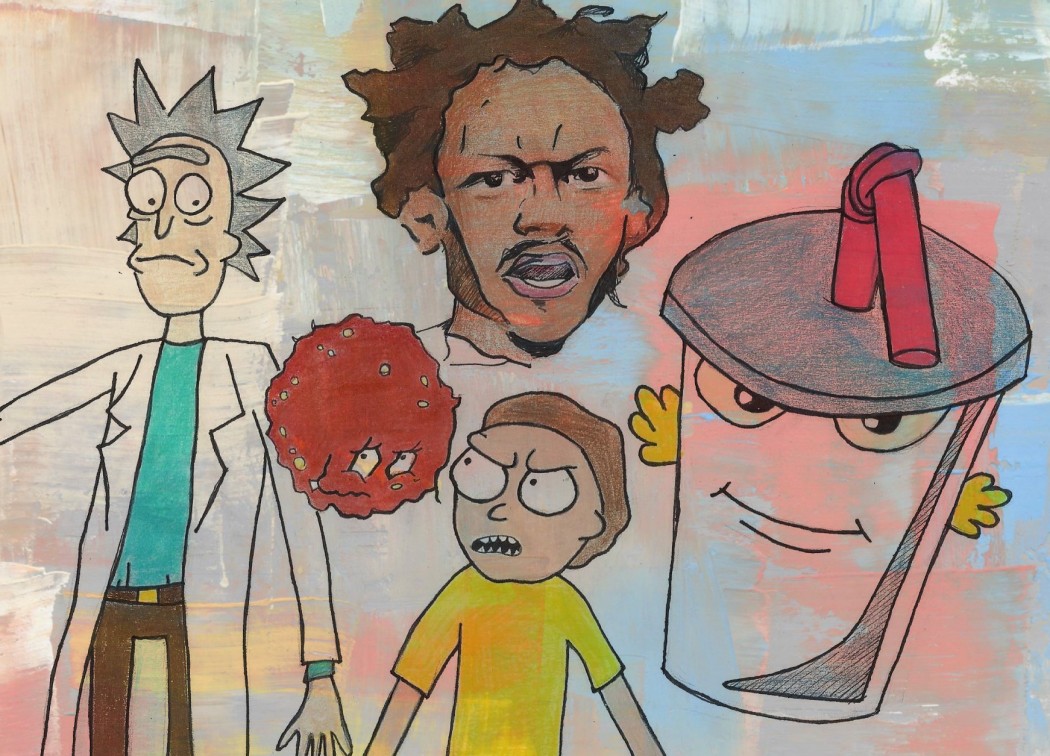Every year, hundreds of new TV shows are announced. Most of them go under the radar, others are host to a flurry of media coverage and a few awards, and a lucky few go on to last in people’s memories for decades. Despite this constant refresh of new television, however, it always feels as though most of the upcoming shows are relatively predictable: a new comedy about a suburban American family, a legal drama, or yet another spinoff of a show that ended a decade ago. While these shows can sometimes be exciting, there’s nothing particularly adventurous or different about them. They’re all just… normal.
And that is why it’s so surprising that Adult Swim ran a show about anthropomorphic fast food characters for eleven seasons and 139 episodes. The network also just renewed a show called Black Jesus for a third season. Another show, whose main character has a snake for an arm, six nipples, and backwards-bending knees ran for two seasons. None of this makes much sense. It’s as though the minds at Cartoon Network just hand over the reins to crazy people every night at 8pm. The content on Adult Swim is so far from regular adult television that it’s incredible the network even exists in the first place.
In going to the exact opposite end of the spectrum of nearly every other channel on air, Adult Swim has found a niche for high-quality yet highly strange storytelling.
But somehow, nearly all of Adult Swim’s content is enjoyable. One might not be able to binge watch their shows – they’re just too strange – but in small bursts and individual episodes, nearly every series is must-watch television. Not because the shows are strange and different, but because they’re good. In going to the exact opposite end of the spectrum of nearly every other channel on air, Adult Swim has found a niche for high-quality yet highly strange storytelling.
Adult Swim began as a quasi-experimental appeal to teens and young adults who were still watching Cartoon Network at night. Space Ghost Coast to Coast, an animated, explicit talk show that drew characters from a 1960s Hanna-Barbera cartoon – was one of the first shows aired on the channel. The humour from the Space Ghost – offbeat, deadpan, and often crude and surreal – helped set the tone for many Adult Swim shows to come (most notably The Eric Andre Show). Still, the airing of Space Ghost, which premiered in 1994, didn’t quite mark the formal inception of Adult Swim.
It is a creative hive-mind, built on finding voices that don’t have another place to make themselves heard.
In 2001, Adult Swim producer and network programmers ‘Williams Street’ released a series of five ‘stealth premieres’—that is, series premieres that were released with little publicity, with the intention of gauging audience interest in new content. Adult Swim was officially created on September 2, 2001, after those five stealth premieres — whose comedic style would help set the tone for the network, just like Space Ghost — had aired. The network quickly became the place for TV series without a stable home, as well as episodes of TV shows that couldn’t be aired anywhere else.
And this is where Adult Swim has made its name: finding the talent that doesn’t quite fit in; the misfits and outcasts from brand-name network television. Adult Swim started as an experiment and hasn’t really changed since; everything the channel airs is pure avant garde entertainment. It is a creative hive-mind, built on finding voices that don’t have another place to make themselves heard. The channel’s experimental style is particularly popular with younger audiences. A Vulture article from 2015 noted that Adult Swim had the lowest median age of viewership (25) when compared with other comedy late night shows like Conan and The Tonight Show. This huge age gap is representative of the fact that Adult Swim attracts a totally different audience, an audience that classic late-night TV barely reaches. When late-night talk shows aren’t interesting enough, young audiences in the especially lucrative 18-35 demographic move to a channel with more unique content.
And this is where Adult Swim has made its name: finding the talent that doesn’t quite fit in; the misfits and outcasts from brand-name network television.
Perhaps the biggest part of this uptick in younger viewers is the style and duration of Adult Swim’s shows. Internet memes, viral videos, and comic remixes are designed for people with short attention spans; you would be hard pressed to find any viral video longer than three minutes. Likewise, Adult Swim shows rarely run for more than fifteen minutes, half the length of the average televised comedy. Even within those fifteen minutes, shows are broken down into shorter parts. Robot Chicken episodes are composed of two minute sketches, perfectly designed for the viral world. Similarly, The Eric Andre Show is made up of brutally short interviews and street sketches that are reminiscent of YouTube prank shows.
Like the style, the humour of Adult Swim is comparable to internet humour, to the point where it’s likely that you could see a clip from an Adult Swim show posted by a Facebook meme page, right next to videos by Cool 3D World and the latest Smash Mouth remix. Xander: Renegade Angel clips and snippets from the several Tim and Eric shows on Adult Swim frequently make their rounds online, often to the point where they are disassociated with the Adult Swim network itself. Have you seen the viral video of “Candy Tails,” the candy you lick off your hair? That’s a clip from The Tim and Eric Awesome Show, Great Job! The new online audience doesn’t necessarily need to know that what they’re watching is from a TV show, simply because the clips fit in with other viral videos so well.
Adult Swim established its dominance as a source of bizarre, crude, and provocative humour long before you were tagging your friends in memes on Facebook.
Adult Swim fits seamlessly into the internet because its brand of humour is distinctly offbeat, designed to disturb, distract, and steal an unintended laugh from its audience. The reason why the internet is such a melting pot of cringe-humor is thanks to its anonymity and lack of creative boundaries. No network television would ever think to air a TV show that comes close to the crudeness of internet humour— except, perhaps, Adult Swim. Adult Swim established its dominance as a source of bizarre, crude, and provocative humour long before you were tagging your friends in memes on Facebook. But while the internet-humour feel of many Adult Swim shows is readily apparent, many are equal parts heartfelt. Rick and Morty is one of the best shows on television because it somehow manages to blend together disturbing cringe-humor with intense human relationships. It’s a combination that shouldn’t work, and probably couldn’t work on any other network, yet Adult Swim is the perfect outlet for a show of this kind.
Additionally, Adult Swim allows its show creators more creative freedom over their content than other networks. Because episodes are short, they’re relatively inexpensive to make, meaning that when a show finds its audience, Adult Swim can easily continue producing it. Adult Swim also avoids expensive marketing campaigns, instead putting more money into producing more original content. This is because the network trusts its viewers to find the shows—a strategy that makes a lot of sense, considering how niche they are. The shows on Adult Swim are also just fun; they don’t take themselves too seriously, and the writers behind them clearly enjoy creating them. Rick and Morty has two episodes that were completely improvised by Justin Roiland (one of the show’s co-creators) and Tom Kauffman. Yet they’re still amazing to watch, fitting in with the other episodes in the series and generating plenty of one-liners to spout to friends.
Adult Swim shows are often sleeper hits, starting with a small following and slowly growing into members of pop-culture ubiquity. They’re strange but fun, disturbing but heartfelt, cooked from a recipe that no other television network can claim to come close to. Weird is good, and Adult Swim is the best at being weird. So sit down and try to endure a few minutes of Xavier: Renegade Angel or Space Ghost Coast to Coast. They might be different from everything else on TV, but that doesn’t mean you should avoid them.


